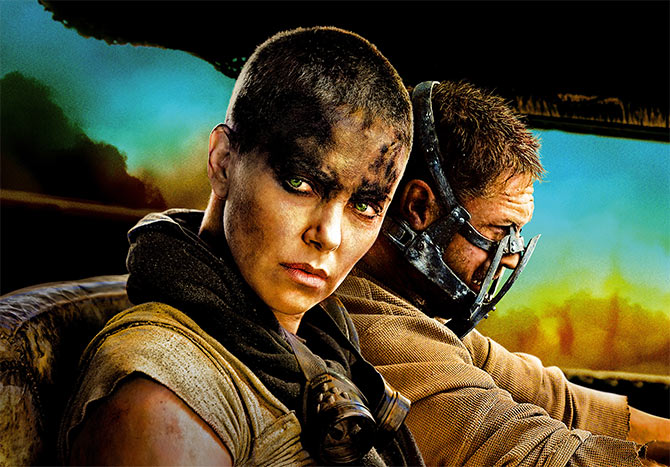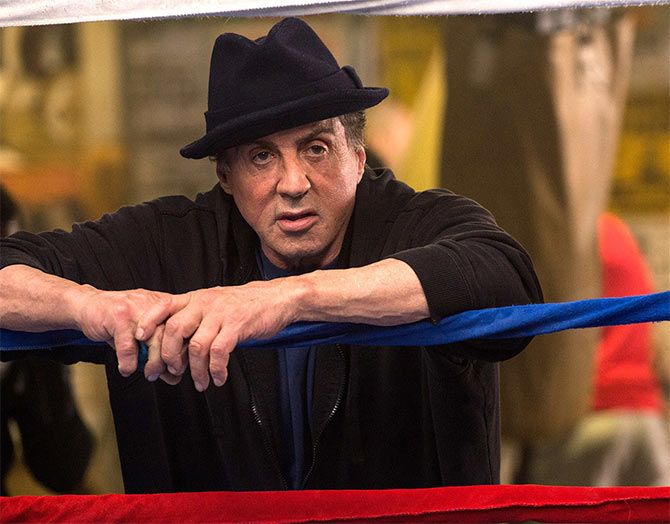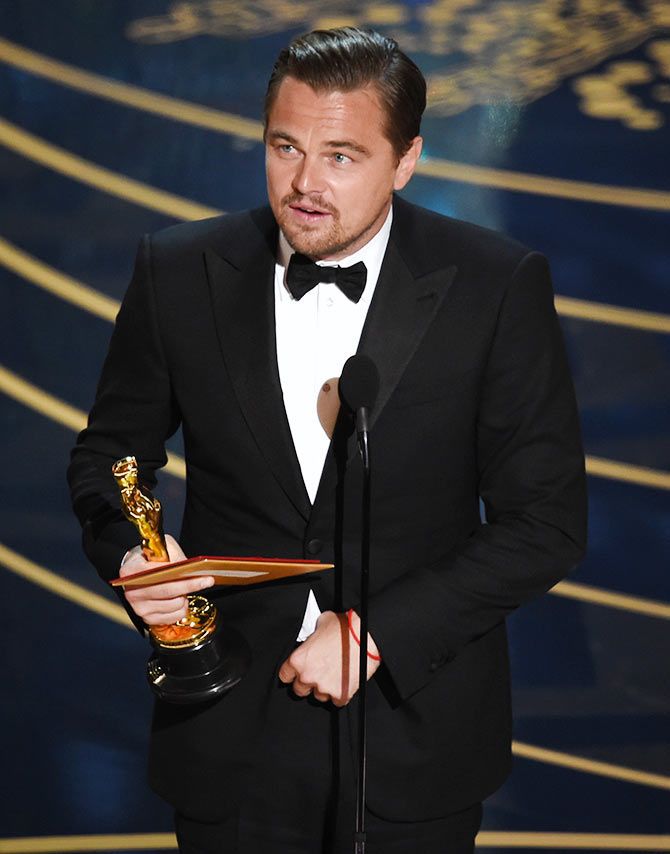
For starters, Mad Max: Fury Road is gloriously nuts, says Raja Sen.

What is better than winning Best Picture?
It sounds bonkers, I grant you, yet hear me out.
At the Oscars, being on the inside of the Best Picture envelope isn't as golden as it gets.
The ultimate prize, the real ultimate prize, is being the film everyone roots for to be inside said envelope -- and then not showing up. Not breasting the tape. Not being Best Picture, but instead losing in a way that inspires public outcry and cinephile heartbreak around the world.
Think about it.
The King's Speech will forever be remembered for being a middling film that got in The Social Network's way.
There's nothing wrong, per se, with Forrest Gump -- a schmaltzy but ingeniously-crafted and well-acted film, with a genuine touch of cheek -- yet how many of us can forgive it for toppling the one and only Pulp Fiction?
The English Patient robbed Fargo.
And, in the most quoted Oscar flub in recent history, Crash beat Brokeback Mountain. Sure, Crash picked up the gold -- after presenter Jack Nicholson chose not to disguise his surprise -- but who won? Who goes down in history?
The underdog, that's who.
It's a lesson we learnt most memorably with a young Italian boxer.
That big lug Rocky Balboa lost the fight at the end of Rocky, but he won over hearts, both of the audience and The Academy, bizarrely beating all-time masterworks like Network, All The President's Men and Taxi Driver at the 1977 Oscars.
At the 88th Annual Academy Awards, no loss rang out as devastatingly as that of 69-year-old Sylvester Stallone. Sitting with crossed fingers in the front row, he was hoping for a Best Supporting Actor trophy in order to complete a remarkable full circle -- a true 'American dream' story from poverty-struck porn-performer to Oscar-winner -- but alas, despite the Academy's much-feted love for a redemptive narrative arc, such picket-fenced perfection was not to be.
There is a terrific picture from Stallone's first Oscars, the one where Rocky triumphed, where he, losing out on Best Actor, holds dead air while the film's producers clutch their Oscars. This moment this year was supposed to be him finally nabbing one he earned at the end of a long career. At long, long last.

And yet Sly lost, despite having performed admirably well in Creed, and while my first reaction (as a fan with Gotta Fly Now coming out of my ears, now, even as I type these words) was that he run up the stairs (of course) to the Oscar stage and check the envelope in case bumbling presenter Patricia Arquette had done a Steve Harvey, the truth is that it adds up.
Mark Rylance was great in Bridge Of Spies.
Not as good as, say, Christian Bale was in The Big Short, but Rylance delivered a finely-tuned and nuanced performance, and was the best thing in that film.
The loss makes sense.
Stallone -- and Balboa in the first film, and Apollo Creed's son Adonis in the latest -- lost the fight when the votes were counted, but boy, did they go the distance. How they made us cheer.
There is, every year, at least one field where we pray against all realistic odds.
This year, I personally rooted -- unrealistically and in vain -- for an upset in the Best Cinematography field, for the invincible Emmanual Lubezki to be upstaged despite his spectacular, masterful vistas in the boastfully shot The Revenant.
Instead, I longed for a reward for the thoughtful, sumptuous visual mastery shown by Ed Lachman in Carol. Shooting on 16mm film, Lachman is consistently poetic and evocative, telling a story while simultaneously mirroring the style of iconic 1950s photographers like Saul Leiter. (It is a magnificently shot film, and I have a feeling Lubezki agrees. On his Instagram yesterday, standing next to the three consecutive Oscars, is Lachman, his face obscured by a camera that is shooting Lubezki. Bravo.)

The world cheered loudly for Leonardo DiCaprio who -- 22 years after the first of his six nominations -- picked up an acting Oscar for The Revenant, though this wait had been mythologised well out of proportion.
Sure, he should have won for The Wolf Of Wall Street, but the Oscars rarely reward performances that effervescent, that electrifying.
Also, the man is merely 41, and has several movies -- several Martin Scorsese movies, even -- yet to tackle. This wasn't the film he should have won for, and certainly not the film he deserved a standing ovation for. He strolled into the Oscars an odds-on favourite, yet the moment was made to feel like a struggle.
Meanwhile, after 500 films, Ennio Morricone, one of the greatest composers in the history of the medium, came forth and won his first competitive Oscar for The Hateful Eight. This, in the oddest and loveliest of ironies, came nine years after he'd won an Honorary Oscar for his contribution to the arts. Who says masters lose their touch?
Not George Miller, certainly.
The world was firmly in Miller's corner on Oscar night, hoping that the visionary 70-year-old would be heralded for one of the finest action movies of all time.
Mad Max: Fury Road is a work of enormous vision, rule-defying bravado and striking originality which flattens audiences with ingenuity, clarity and adrenaline. It is a progressive, modern, thematically strong, diverse, feminist statement wrapped up, quite miraculously, into a thrilling package.
However, it isn't as if a bad film won.
A victory for The Revenant, jawdropping but hollow, would have felt catastrophic.
Spotlight winning, on the other hand, seems right. It is a restrained, relevant, highly impactful film made with a crackerjack ensemble cast, based on a story that needs telling. (The Big Short, my personal pick of the Oscar bunch, was clearly too edgy and audacious and irreverent and, quite frankly, too clever to win a big Oscar -- rather like the work of Charlie Kaufman. Way too cool for school.)
Speaking of which... Think, if you will, of The Doof Warrior.
Riding atop a truckful of gigantic speakers and standing on a massive amplifier, The Doof Warrior in Mad Max: Fury Road is a rocker in a scarlet onesie: a blind man wearing his mother's face for a mask, playing a double-necked guitar made out of a bedpan that also doubles up as a flamethrower.
Playing ragged riffs to appease the gods of war and increase fighter morale, he is, without any doubt, as insanely mental as a character can conceivably be.
It's gloriously nuts.
Now, realistically speaking, does such a creature have any business belonging in a movie that wins an Oscar for Best Picture?
Or ought he belong, instead, to a movie that -- like a Lamborghini Countach pinup stumbled upon giddily in pre-adolescence -- deserves to have its poster stuck up inside our brains forever?
It's our film to celebrate, and, hey: as worshippers of V8 engines would agree, chrome is way, way cooler than gold.










